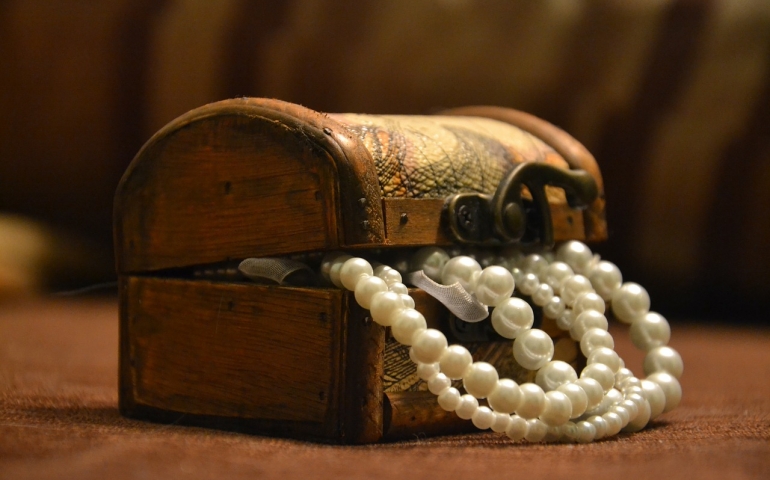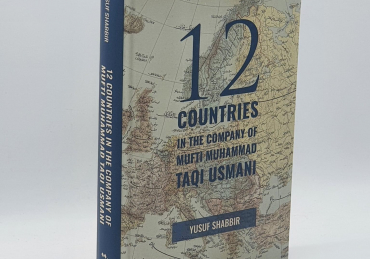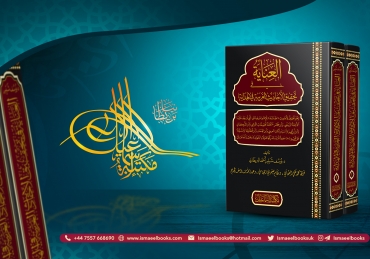Pearls of Mufti Muhammad Taqi Usmani (2019)
بسم الله الرحمن الرحیم
Whilst travelling with Shaykh al-Islam Mufti Muhammad Taqi Usmani (b. 1362/1943) in Greece and Hungary and also in the UK, we had the opportunity to discuss a number of issues with him. In addition, Mufti Ṣāḥib shared some discourses and interesting facts during his speeches and one-to-one conversations. Some of these have been outlined in the Greece and Hungary travelogue, the remainder are outlined in brief below.
Books
- I asked Mufti Ṣāḥib regarding the history book he benefited from the most. He replied, “al-Bidāyah wa al-Nihāyah” adding that upon his instruction Mawlānā Rayḥān Ismāʿīl authored a book titled ‘Tārīkh Millat Islāmiyyah’. Mufti Ṣāḥib said, “You will not come across a book like it.”
- I asked Mufti Ṣāḥib regarding the tafsīr books he benefited from the most. He replied, “Tafsīr Ibn Kathīr and al-Tafsīr al-Kabīr of Imam Rāzī” adding that the statement ‘therein is everything but tafsīr’ is a gross injustice.
- I asked Mufti Ṣāḥib whether he has information regarding the attribution of Kitāb al-Raʾy to Imam Abū Ḥanīfah (d. 150/767), as attributed by Mawlāna Abū al-Wafāʾ Afghānī (d. 1395/1975) and his student Dr ʿAllāmah Muḥammad Ḥamīdullāh (d. 1423/2002). Mufti Ṣāḥib said he is unaware of this attribution or this book.
- Mufti Ṣāḥib said, “The second volume of al-Mudawwanah (the ḥadīth encyclopaedia) has been printed and the third has gone to print. The fourth volume is also ready and will be printed after the third. The third and fourth volumes feature the chapters of purity.”
Contemporary issues
- Mufti Ṣāḥib said, “I dislike the title ‘Islam in America’ for conferences because Islam is only one wherever it is.”
- Mufti Ṣāḥib said, “If a person adopts the quality of repelling bad with good, many disputes would end.”
- Mufti Ṣāḥib said, “The supplication ربنا هب لنا من أزواجنا وذرياتنا قرة أعين should be read frequently, read it in each Ṣalāh, particularly in countries where there are many risks.”
- Mufti Ṣāḥib said, “Duʿāʾ can make the (apparently) impossible possible.”
- Mufti Ṣāḥib said, “If a Muslim organisation is forced to undertake a sinful activity due to legislation or otherwise, do not attempt to justify it, regard the sin a sin and seek Allah’s forgiveness.”
- Mufti Ṣaḥib said, “Muslim schools with all their weaknesses are better than the normal schools. People need to consider what is the alternative and keep in mind the principle of the lesser of the two evils.”
- Mufti Ṣāḥib said, “ʿIlm al-ʿAqīdah is necessary, it is brief. ʿIlm al-Kalām is not necessary for the layman.”
Fiqh
- I asked Mufti Ṣāḥib regarding travel insurance. He explained that it is not permissible unless there is a need, for example, if it is a legal requirement.
- I asked Mufti Ṣāḥib regarding the assertion of ʿAllāmāh Ibn ʿĀbidīn (d. 1252/1836) that if the prayers are combined, one should recite behind the Imam and apply the ablution rulings of the Shāfiʿī school. Mufti Ṣāḥib commented that this is not the muftā bihī position. I suggested that the mālikī and ḥanbalī schools also permit combining prayers and they do not share the Shāfiʿī position on reciting behind the Imam.
- Mufti Ṣāḥib was asked in Hungary regarding conventional interest-based mortgages. Mufti Ṣāḥib replied that they are impermissible.
- Mufti Ṣāḥib said in relation to the stunning of animals before slaughter, “There are two issues here that should not be confused. The first, whether stunning is lawful or not, and second, whether the stunned animal will be Halal to consume or not.” Mufti Ṣāḥib outlined the harms of stunning and the pain it causes to animals.
- Mufti Ṣāḥib said, “The meaning of iḥsān towards animals will not change due to ʿUrf.”
- I asked Mufti Ṣāḥib regarding the research of some scholars who suggest that the principle of ‘there is no consideration for Ikhtilāf al-Maṭāliʿ’ is not from the ẓāhir al-riwāyah. Mufti Ṣāḥib commented that it is difficult to negate its existence in the ẓāhir al-riwāyah altogether. It has been relied upon by later scholars and Imam Qāḍīkhān (d. 592/1196) is a very senior jurist. At best, one should say that he was unable to locate it. The published versions of the ẓāhir al-riwāyah books are incomplete, there could be several versions and sometimes issues are found in the not so obvious chapters.
- Mufti Ṣāḥib said, “When we perform ablution, do we even think about the water that is wasted?”
- I asked Mufti Ṣāḥib regarding compensation following a flight delay. He said it is permissible to use, as it is tabarruʿ (gift).
- Mufti Ṣāḥib said, “If women happen to be in the Masjid for a religious programme for example, it is permissible for them to perform Ṣalāh behind the Imam.”
- I asked Mufti Ṣāḥib regarding the liability of a money transfer service provider in the UK who works on a commission basis to transfer money to India and deliver them to the recipient in rupees after conversion. However, his counterpart in India disappears with the money. Is the money transfer service provider in the UK liable? Mufti Ṣāḥib explained that he is liable, because the customer in the UK is in effect conducting a money exchange transaction with the money transfer service provider by giving him pounds in the UK in exchange of receiving rupees in India, and therefore he is responsible to deliver the rupees in India.
Ḥadīth
- I asked Mufti Ṣāḥib regarding Imam Ḥākim’s (d. 405/1014) authentication of ḥadīths and Ḥāfiẓ Dhahabī’s (d. 748/1348) approval and the mixed views in this regard. Mufti Ṣāḥib suggested that when Ḥafiẓ Dhahabī writes ‘Ṣaḥīḥ’ in his Talkhīṣ it is better to write, “and Dhahabi remained silent on it” as opposed to “Dhahabī agreed with it”, adding that Dhahabī’s silence can be relied upon unless something contrary exists within his writings. [Compiler’s note: refer to al-ʿIqd al-Thamīn fī Ḥubb al-Nabī al-Amīn ﷺ under the fifth ḥadīth for references].
- Mufti Ṣāḥib quoted ʿAllāmah Anwar Shāh Kashmīrī’s (d. 1352/1933) discourse that from among the greatest bounties of Paradise is that the reality of concepts will be disclosed and this will be more pleasurable than many other bounties. Mufti Ṣāḥib explained that for example what does it mean that Subḥanallāh fills the scale or Al-Ḥamdulillāh fills what is in between the sky and the earth.
- I asked Mufti Ṣāḥib regarding the origins of rice. He responded that he is unaware, however, some routes of the ḥadīth of the three cavemen mention rice (Ṣaḥīḥ al-Bukhārī, 2333, 3465, 5974; Fatḥ al-Bārī, 6:507), adding that Arabia did not produce rice as it requires water.
Names
- I informed Mufti Ṣāḥib regarding my short treatise on the name Shabbīr and asked him if he has come across the origins or the basis of the name Shabbīr as is commonly pronounced. Mufti Ṣāḥib responded that it is Shubayr and that Shabbīr does not exist in Arabic. I informed Mufti Ṣāḥib that I could only find Shubayr and Shabīr (with a single b). A discussion followed regarding names including the name Laibah. (For more details, refer to this link). Mufti Ṣāḥib cited the name Sharjīl and it has become so common from the original Shuraḥbīl.
- Mufti Ṣāḥib is asked regarding keeping dual names such as Muḥammad Yūsuf. Mufti Ṣāḥib explains that the actual name is Muḥammad and that the second part of the name is for differentiation, similar to Muhammad the first, Muhammad the second. The second reason behind this is to avoid disrespecting the name Muḥammad. Both these reasons were mentioned by Mufti Muḥammad Shafīʿ Ṣāḥib (d. 1396/1976).
Personalities
- Mufti Ṣāḥib said, “The demise of Ḥaḍrat Mawlānā Yusuf Motala is a great loss.” He also said, “There are two personalities who did revolutionary work in the UK: Hafiz Patel and Mawlānā Yusuf Motala.”
- I mentioned to Mufti Ṣāḥib that when Ḥāfiẓ Dhahabī’s (d. 748/1348) name is mentioned, a sweetness is experienced on the tongue. Mufti Ṣāḥib said there is no doubt regarding this. Allah Almighty created such people to preserve ḥadīths. Such was his status that Ḥāfiẓ Ibn Ḥajar (d. 852/1449) supplicated to Allah to grant him the rank of Ḥāfiẓ Dhahabī (see al-Jawāhir, 1:166).
- I asked Mufti Ṣāḥib regarding Dr Muḥammad Ḥamīdullāh (d. 1423/2002). Mufti Ṣāḥib said, “When Pakistan was established, Muhammad Ali Jinnah established a committee to devise the constitution of Pakistan. Dr Hamidullah was a member of this committee, as was my respected father and Mawlānā Manāẓir Aḥsan Gīlānī (d. 1375/1956). I met Dr Hamidullah several times. He was invited to Bahawalpur to deliver some lectures and I chaired one of the sessions. I also visited him in Paris. He was extremely humble. Perhaps, there is no example in Europe of someone like him in terms of zuhd (abstinence from the world). His residence in Paris was a small apartment on the fourth or fifth floor of a building, it was more like a servant’s quarter. When I did some work on Iẓhār al-Ḥaq, he wrote to me congratulating me. I have many of his letters. He was a great person. His expertise was Sīrah and history. Fiqh was not his domain. In the session I chaired in Bahawalpur, he mentioned that there is no harm for a person to hold a shādh (irregular) view, because lāḥiq ijmāʿ (latter consensus) abrogates sābiq ijmāʿ (earlier consensus) and that a latter consensus begins with one person holding a view that is initially shādh (for details, refer to Khuṭubāt Bahāwalpūr). I commented following the speech that this is questionable because a latter consensus emerges after the mutual consultation and agreement of a large group of experts based on changing circumstances. He was so humble that he said he will review his position. Thousands of people accepted Islam on his hands. It is said that on average five people would accept Islam on his hands daily. He was thin and had a small stature. Such a humble person is rare to find. An onlooker would not know he is such a great researcher. He was not valued as he should have been.”
- I asked Mufti Ṣāḥib if his father Mufti Muḥammad Shafīʿ ʿUthmānī (d. 1396/1976) adopted or was inclined to any positions of the other schools of thought. Mufti Ṣāḥib could not recollect any and explained that his father would generally, where necessary, find a marjūḥ (weak) view within the ḥanafī tradition. In relation to muʿāmalāt (transactions), he would permit acting upon the positions of the other schools.
Quran
- Mufti Ṣāḥib said, “There is no bounty equivalent to the Quran. To reform people, there is nothing more effective than the Quran.”
- Mufti Ṣāḥib said, “In Deoband, when I was young, the voice of Quran would be heard in the morning from every house.”
- Mufti Ṣāḥib said, “Put aside 1000 lectures, put aside 1000 books, understanding one verse of the Quran is better. Scholars should start the durus (lessons) of the Quran in their mosques.”
- Mufti Ṣāḥib said, “To teach the higher books of the dars niẓamī is easy, to teach the memorisation of the Quran is difficult.”
- Mufti Ṣāḥib said, “There is no equivalence of the science of tajwīd in any other language. How a letter should be pronounced and from where it should be pronounced is unique to Islam.”
- Mufti Ṣāḥib said, “Correct your tajwīd in 29 days by focusing on one letter a day.”
- Mufti Ṣāḥib said, “Begin your day every day with the recitation of the Quran even if it is a small amount. This has many benefits.”
Social Media
- Mufti Ṣāḥib said, “Sometimes I think I should stop using WhatsApp altogether.”
- Mufti Ṣāḥib said, “Social media is very powerful. Within minutes, messages and tweets spread to millions of people. There is no need for press statements now.”
- Mufti Ṣāḥib said, “I was strict regarding video broadcasts in the past. However, I am flexible now because I have seen its positive impact on the lives of people. Many people write to me that their lives changed after watching a speech of mine.”
Tazkiyah and Piety
- Mufti Ṣāḥib said, “Good deeds are the currency of the hereafter.”
- Mufti Ṣāḥib said, “Bayʿat with a Shaykh is neither farḍ nor wājib. What is necessary is the purification of one’s soul.”
- Mufti Ṣāḥib said, “Allah Almighty will establish the scales of justice in the hereafter. Herein is a lesson: Not only must justice be done, it must also be seen to be done.”
- Mufti Ṣāḥib said, “How will the deeds become heavy in the scales of the hereafter? Look at the first ḥadīth of Ṣaḥīḥ al-Bukhārī! Ikhlāṣ makes a deed heavy.”
- Mufti Ṣāḥib said, “A major fitnah is to please the masses.”
- Mufti Ṣāḥib said, “I have been requested to deliver a short 15-minute speech. This is not objectionable. Religious discourses do not require a long speech. A short talk with sincerity is sufficient. A companion once said to the Prophet ﷺ: عظني وأوجز (Give me advice and be brief).”
- Mufti Ṣāḥib said, “There is a fine difference between humility and humiliating one’s self. The former is recommended whilst the latter is not. A spiritual mentor is required to guide a person in such matters.”
- Mufti Ṣāḥib said, “The reality of tawāḍūʿ (humility) is that a person believes that he is nothing, he has no accomplishments to boast about, whatever he has is from Allah Almighty.”
- Mufti Ṣāḥib said, “Istigfār and tawbah are weapons against Satan.” He also said, “Prophet Adam’s error and subsequent repentance reflects the reality that his children will err and that the remedy is repentance.”
Travels
- Mufti Ṣāḥib’s father Mufti Muḥammad Shafīʿ ʿUthmānī (d. 1396/1976) would comment that having children is one bounty, and having them present with you is another bounty. This is why the Quran says: وبنين شهودا. It is reported from ʿAlī ibn Abī Ṭālib (d. 40/661) (may Allah be pleased with him) that he said, “From the good fortune of a person is that his spouse is compatible, his children are obedient, his associates are pious and his sustenance is in his town.” [The isnād of this narration has been described munkar, see ʿIlal al-Ḥadīth of Ibn Abī Ḥātim, 3:692; Tārīkh Dimashq, 54:178; Fayḍ al-Qadīr, 1:466; al-Mudāwī, 1:495].
- Mufti Ṣāḥib said at Jamia Masjid Henry Street, Batley, UK, “Mawlānā Ayyūb Kholwādia was the first person to invite my respected father Mufti Muḥammad Shafīʿ ʿUthmānī (d. 1396/1976) to the UK some 46 years ago. My father was ill. He wrote a letter excusing himself and suggesting that he has two sons and they will visit one day. When I came many years ago, Mawlānā Ayyūb Ṣāḥib reminded me of this letter and said that it is qarḍ (debt) on you. Today, I am happy and also sad, happy because I am fulfilling this debt based on what my father wrote 46 years ago, and sad because Mawlānā Ayyūb Ṣāḥib is no longer with us.”
Yusuf Shabbir
8 October 2019 / 9 Ṣafar 1441
Related articles:
- Visit to Greece and Hungary with Shaykh al-Islam Mufti Muhammad Taqi Usmani
- Gems of Mufti Muhammad Taqi Usmani (2019)
- UK Tour 2018: Discourses of Shaykh al-Islām Mufti Muḥammad Taqī ʿUthmānī
- In the company of Shaykh al-Islām Mufti Muhammad Taqi Usmani in al-Madinah al-Munawwarah
- Visit to Malta and Cyprus with Shaykh al-Islam Mufti Muhammad Taqi Usmani
- Treatise on the hadiths of Umm Haram bint Milhan and her demise in Cyprus (Arabic)
- 80 countries visited by Shaykh al-Islam Mufti Muhammad Taqi Usmani
- Seven Days in Bukhara and Samarqand with Mufti Muhammad Taqi Usmani (b. 1362/1943) and Mufti Shabbir Ahmed (b. 1376/1957)
- 12 day tour of the Balkan States in the company of Mufti Muhammad Taqi Usmani, Mufti Ahmed Khanpuri, Mufti Shabbir Ahmed and other scholars
- Adhkār and the protection of Shaykh al-Islām Mufti Muhammad Taqi Usmani from assassins
- Six days in Pakistan
- Profile of Mufti Muhammad Taqi Usmani (Arabic)
- Mufti Muhammad Taqi Uthmani on the unlawfulness of wealth unless it is given wholeheartedly







